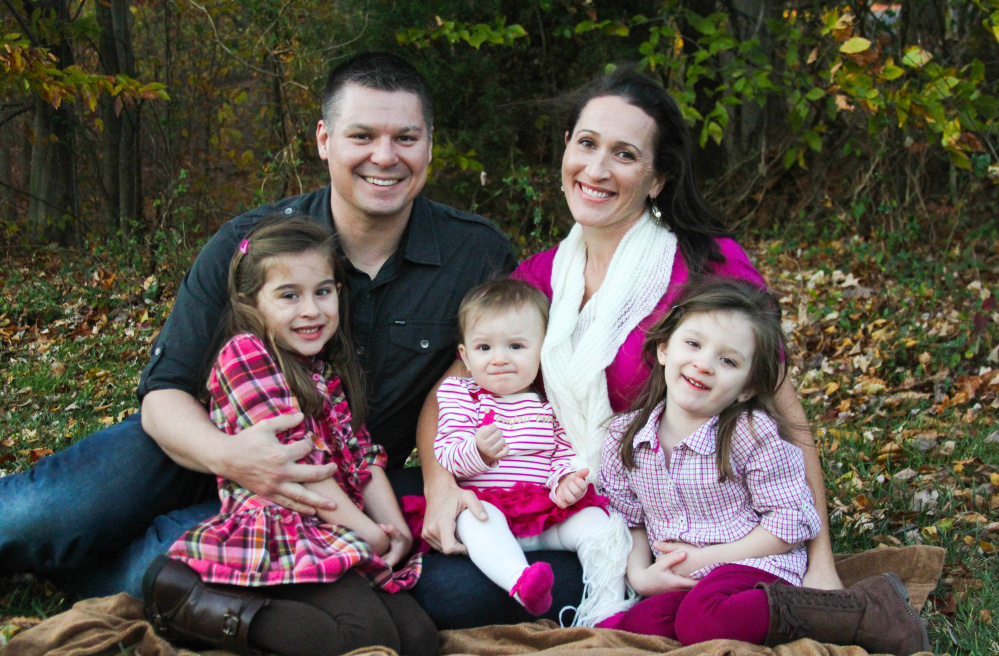Shelane Gaydos always wanted a big family. The Herndon, Virginia, woman and her husband, both Fairfax County police officers, had three little girls and were expecting their fourth child when they learned during a routine 12-week ultrasound that the baby’s heart had stopped beating.
Gaydos was devastated. In the days that followed, she blamed herself, worried aloud that she had let her husband down, and told her sister that she felt like a failure. She took time off work, stopped sleeping. Two weeks after the doctor’s appointment, she ended her life.
Her family and friends have spent the past two years trying to understand what happened to the 35-year-old woman they knew to be ambitious, passionate and fiercely dedicated to her children.
“It was natural, of course, that she would be depressed,” said her mother, Joanne Bryant of Fairfax Station, Virginia, who is now helping to raise her three grandchildren. “We did not know to what degree.”
Gaydos’ family believes her death was the result of postpartum psychosis, a rare illness that can cause delusions and paranoia. And they have become advocates for raising awareness about the range of mental-health issues – often referred to as postpartum depression – that can affect expectant or new mothers.
UNDERDIAGNOSED, UNDERTREATED
At least one in seven women experience anxiety or depression during pregnancy or in the first year after birth, making mental-health disorders the most common complication of pregnancy. Despite this, maternal depression remains vastly underdiagnosed and undertreated, with just 15 percent of women affected seeking professional help.
In recent years, advocates say, there has been new progress in understanding and treating an illness that half a million U.S. women experience each year. Medical providers are screening for depression more routinely, and lawmakers are beginning to look for solutions for expanding treatment options.
Last November, Congress passed the Bringing Postpartum Depression Out of the Shadows Act as part of a large medical research funding bill to provide federal grants to states to create programs that screen and treat women for maternal depression. The bill had broad bipartisan support, but funding for the grants is now in question. The House last week approved just $1 million of the $5 million originally allocated. The Senate has yet to vote.
Rep. Katherine Clark, D-Massachusetts, who introduced the bill, said many women struggle silently through what is supposed to be “the happiest time of their lives.”
“Moms have a lot of guilt about how they feel, so they don’t seek treatment,” she said. “We want to reduce the stigma and increase awareness that this is highly treatable.”
HORMONES TRIGGER MOOD SWINGS
About 80 percent of women experience “baby blues” within the first few weeks of child birth, often defined by mood swings and irritability or sadness. Maternal depression is longer lasting and has more-severe symptoms, which can include anxiety, sleeplessness, extreme worry about the baby, feelings of hopelessness, and recurrent “intrusive thoughts” about hurting themselves or the baby.
Women are more likely to attempt suicide during the first year after childbirth than during any other time in their lives, and they tend to choose more lethal means.
These mood disorders are triggered by fluctuating hormones, including estrogen and progesterone, that ramp up during pregnancy and then drop off sharply after birth. Another significant hormonal shift occurs when women stop breast-feeding.
Researchers are trying to understand what predisposes some women to be more sensitive to these hormonal fluctuations.
It’s clear that environmental stressors play a role. The prevalence of depression is far higher for women who are poor or in abusive relationships or for women whose babies are born premature or disabled.
The stress of having a child is also exacerbated by unrealistic societal expectations, advocates say.
To raise awareness, friends and family of Shelane Gaydos organized a 5K run last fall to honor the police officer and avid runner. They hope to make the symptoms well known to women and those who love them. They plan to have another run in October.
“If Shelane had known that this was curable, that she could have gotten better, she would have been that patient who did every single thing, so she could still be here for those girls,” said Laura Tiso, a longtime friend.
Two years after his wife died, Brian Gaydos said he has finally stopped asking God every day to bring her back.
His life has changed “more than 180 degrees,” as he became a single father to his three daughters and learned to cope without the woman he called his best friend and soul mate.
When people ask him what happened, he tells them: “She died from a disease called postpartum depression.” He said the answer makes many people uncomfortable:
“You have to break through the uncomfortable,” he said. “We are losing a silent battle that no one wants to talk about.”
Copy the Story LinkSend questions/comments to the editors.



Success. Please wait for the page to reload. If the page does not reload within 5 seconds, please refresh the page.
Enter your email and password to access comments.
Hi, to comment on stories you must . This profile is in addition to your subscription and website login.
Already have a commenting profile? .
Invalid username/password.
Please check your email to confirm and complete your registration.
Only subscribers are eligible to post comments. Please subscribe or login first for digital access. Here’s why.
Use the form below to reset your password. When you've submitted your account email, we will send an email with a reset code.